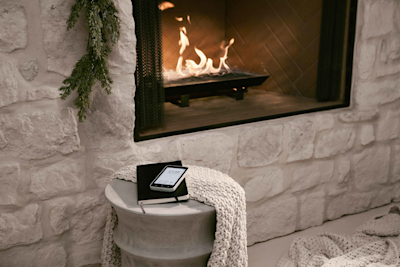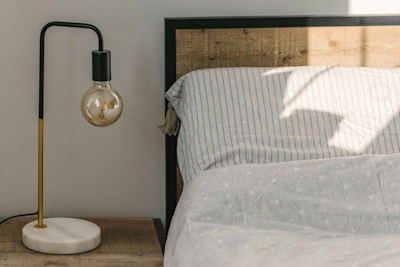
5 simple ways to break free from smartphone dependence
How to free yourself from smartphone dependence
Smartphones have become an integral part of our daily lives, providing us with constant access to information, communication, and entertainment. However, our dependence on these digital devices can have some negative impacts on our physical, mental, and emotional health, as well as our quality of life. Studies have shown that excessive smartphone use can lead to feelings of anxiety, depression, sleep disorders, physical strain on the eyes, neck, and back, and a reduced ability to focus and concentrate. These negative effects are even more visible in adolescents and children. [1][2]
In order to mitigate these negative effects, it's important to take steps to break free from smartphone dependence. At Mudita, we’ve big proponents of intentional unplugging and limiting screen time, so let’s look at five simple ways how you can reduce your smartphone usage and improve your overall well-being.
These easy strategies, such as setting designated times for device usage, creating device-free zones, engaging in alternative activities, turning off notifications, and connecting with people face-to-face, can help you reclaim your time and improve quality of life. [3]
1. Set designated times for device usage
One of the most effective ways to break free from smartphone dependence is to set designated times for device usage. This means scheduling time in your day when you will allow yourself to use your smartphone, and then putting it away during the rest of the day. This can help you stay focused on other important tasks, and give you a break from the constant distraction of your device.
To set designated times for device usage, start by identifying the times when you need to use your smartphone, such as for work or communication with friends and family. Then, schedule specific times when you will allow yourself to use your device, such as during your lunch break or in the evening after dinner. During the rest of the day, put your phone away and focus on other activities. If you do need to stay connected, try a phone focused on mindful tech use, such as Mudita Kompakt. This way, you can always be within reach, however, you won’t be tethered to a digital device that is always looking for your attention.
2. Create device-free zones
Another effective way to break free from smartphone dependence is to create device-free zones in your home or workplace. This means setting up areas where you are not allowed to use your smartphone, such as the dinner table, the bedroom, or the bathroom. This can help you stay present in the moment and avoid the temptation to constantly check your device. The bedroom is especially important because your bedroom should be a sleep sanctuary where you can relax, unwind, and get the quality rest you need.
To establish device-free zones, it is important to first identify the areas where you are most likely to overuse your smartphone unnecessarily, then designate these areas as dedicated zones, free from any digital device usage. Additionally, you may want to establish rules and protocols with your partner, family or roommates to promote a collective adherence to designated device-free periods throughout the day. For example, if you designate your bedroom a device-free zone, encourage your partner to also leave their device outside of your sleeping environment. If you depend on your smartphone to wake you up in the morning, switch to a classic alarm, such as Mudita Bell or the mindful Mudita Harmony, so that you can unplug and embrace each day more mindfully.
3. Engage in alternative activities
One of the reasons we become dependent on our smartphones is that we don't have enough engaging activities to occupy our time. To break free from smartphone dependence, it's important to find alternative activities which you enjoy and that can distract you from your device. This can be anything from reading a book to going for a walk, or even trying a new hobby.
Start by identifying the activities that you enjoy or those that you have always wanted to try. Then, set aside time in your day to engage in those activities. You can also invite friends or family to join you in these activities, which can help you stay motivated and accountable.
4. Turn off notifications
Smartphones are notorious for bombarding us with constant notifications which can distract us from important tasks throughout the day. If you're trying to reduce your smartphone dependency, it's crucial to take control of your notifications. A good way to do this is by turning off notifications for non-essential apps and only allowing notifications for important messages and calls. By doing this, you can stay focused and avoid getting sidetracked by your device.
To get started, take a look at your apps and turn off notifications for the ones that aren't essential. You can also set aside specific times during the day to check your notifications, such as during designated periods when you're allowed to use your device. This will help you stay on track and keep your attention where it's needed most. If your willing to go even further, there are ways that you can turn your smartphone into a feature phone:
Check out our article which contains a step-by-step guide:
How to turn your smartphone into a feature phone
5. Connect with people face-to-face
Finally, if you're looking to overcome your dependence on your smartphone, one of the most powerful strategies is to invest in face-to-face connections with other people. Instead of solely relying on social media or messaging apps to connect, make an effort to carve out time for in-person interactions with friends and family. These kinds of interactions can help you develop stronger relationships, as well as enhance your overall well-being.
A great place to start is by regularly scheduling get-togethers with friends and loved ones. Additionally, joining social clubs or attending events that align with your interests can introduce you to new people and broaden your social network. By taking these steps, you can help ensure that you're building meaningful connections that enrich your life.
READ: The Power of Human Connection
Find Balance
Smartphone dependence is a real problem which affects many of us. However, with these 5 simple tips, you can start breaking free from your dependence and improve your overall well-being. By setting designated times for device usage, creating device-free zones, engaging in alternative activities, turning off notifications, and connecting with people face-to-face, you can start to reclaim control over your life and reduce the negative impact that smartphones can have on your mental and physical health.
If you're feeling overwhelmed by your smartphone usage, take the first step today and try implementing one or more of these tips into your daily routine. With a little bit of effort and determination, you can break free from your dependence and start living a happier, healthier life.
Remember, your smartphone should be a tool to enhance your life, not control it.
If you enjoyed reading this article, and would like to to learn more about living a more technologically mindful lifestyle, please take a moment to read our other posts on our blog:
Related stories

Is Short-Form Video Hurting Your Focus?
New research shows short-form video may weaken attention. Explore how mindful tools and Mudita Kompakt support healthier digital habits.

Starting the New Year with Fewer Distractions, Not More Tech
A gentle January reset. Start the new year with fewer distractions and learn how mindful tech use can support focus, rest, and more meaningful downtime.

5 Things Sleep Experts Say We Still Get Wrong About Sleep
Are you making these 5 sleep mistakes? Learn what experts say about sleep trackers, workout timing, and why hitting snooze makes you feel worse, not better.
If you'd like to receive the best stories from our blog, keep up to date with our progress and get notified about our product releases and special discounts.